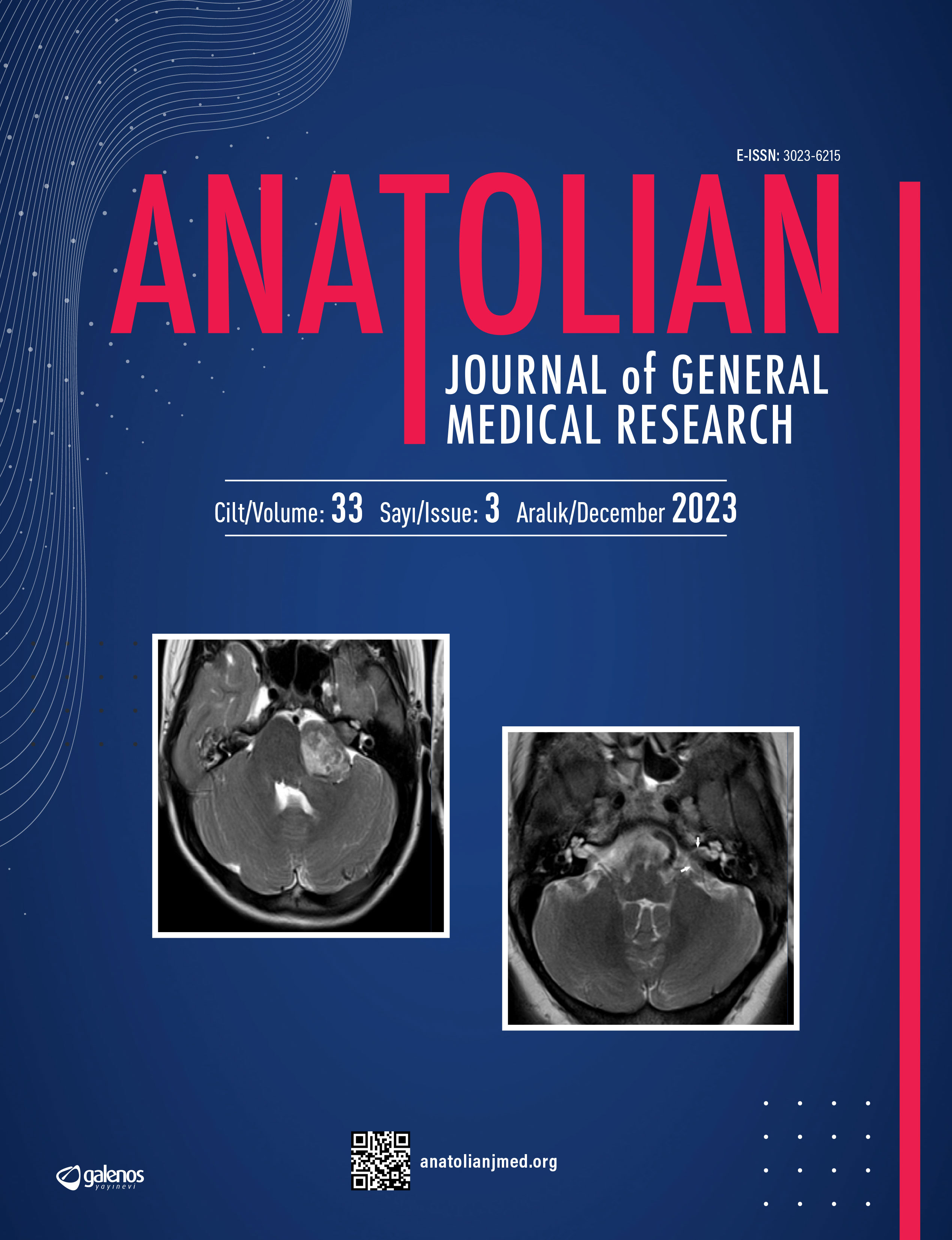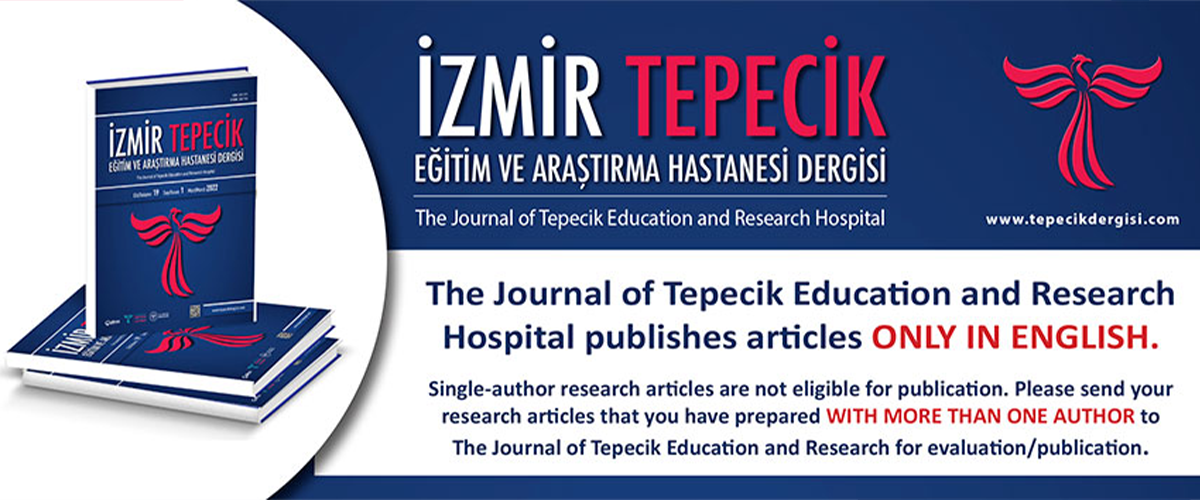








Assessment of Factors Affecting the Treatment Efficacy of Radioactive Iodine (I-131) Therapy in Patients with Hyperthyroidism
Ferhat Arık1, Ferhat Gökay2, Bade Erturk Arık31Tomarza Yaşar Karayel State Hospital, Internal Medicine, Kayseri, Turkey2Kayseri City Hospital, Kayseri, Turkey
3Department of Family Medicine, Faculty of Medicine, Erciyes University, Kayseri, Turkey
Objective: Hyperthyroidism is an increase in hormone production in the thyroid gland and the exposure of tissues to the hormones of the thyroid glands in the circulation. The most common causes encountered are Graves’ Disease, Toxic Multinodular Goiter and Toxic Adenoma. The purpose of radioactive iodine treatment is to make patients become euthyroid or hypothyroid. Despite adequate treatment, hyperthyroidism persists or reccurs in some patients. The aim of our study is to investigate the factors affecting the efficacy of radioactive iodine treatment in hyperthyroidism.
Methods: In this retrospective study, relevant clinical and laboratory data were recorded in database of Kayseri Training and Research Hospital, Endocrinology and Metabolism Diseases Outpatient Unit between 2013-2016.
Results: A total of 79 cases including 17 (21%) male, and 62 (79%) female patients were enrolled in the study. There were 33 (42%) Graves’ disease 9 (11%) Toxic Multinodular Goitre and 37 (47%) Toxic Adenoma patients when grouped according to diagnoses. Mean age was 56.5 ± 16,80. Development of hypothyroidism or euthyroidism were accepted as efficient treatment, hyperthyroidism or recurrence were considered as treatment failure. In 71 (89%) patients, treatment efficiently resulted in hypothyroidism or euthyroidism, whereas in 8 (11%) patients, the treatment failed due to recurrence or persistent disease. Treatment was 100 % effective in Toxic Multinodular Goitre and Toxic Adenoma groups, while it was effective in 75.7 of patients with Graves’ Disease. Patients who did not use antithyroid drugs recovered faster than patients who did.
Conclusion: Radioactive iodine therapy is an efficient treatment in patients with hyperthyroidism. It was determined that 1 mm increase in nodule size decreased the treatment efficacy by 1.07 times (p<0,05). However, there are many factors that affect the efficacy of this treatment. To elucidate these factors and improve clinical practice, prospective long-term studies providing more reliable data with larger samples needed.
Hipertiroidi Hastalarında Radyoaktif İyot (I-131) Tedavi Başarısını Etkileyen Faktörlerin Değerlendirilmesi
Ferhat Arık1, Ferhat Gökay2, Bade Erturk Arık31Tomarza Yaşar Karayel Devlet Hastanesi, İç Hastalıkları, Kayseri, Türkiye2Kayseri Şehir Hastanesi, Kayseri, Türkiye
3Erciyes Üniversitesi Tıp Fakültesi, Aile Hekimliği Ana Bilim Dalı, Kayseri, Türkiye
Amaç: Hipertiroidi, tiroid bezinde hormon üretiminde bir artış ve dokuların dolaşımdaki tiroid bezlerinin hormonlarına maruz kalmasıdır. En sık karşılaşılan nedenler Graves Hastalığı, Toksik Multinodüler Guatr ve Toksik Adenomdur. Radyoaktif iyot tedavisinin amacı hastaları ötiroid veya hipotiroidi haline getirmektir. Yeterli tedaviye rağmen, hipertiroidi bazı hastalarda devam eder veya tekrar eder. Çalışmamızın amacı hipertiroidide radyoaktif iyot tedavisinin etkinliğini etkileyen faktörleri araştırmaktır.
Yöntem: Bu retrospektif çalışmada, 2013-2016 yılları arasında Kayseri Eğitim ve Araştırma Hastanesi Endokrinoloji ve Metabolizma Hastalıkları Polikliniğinde klinik ve laboratuvar verileri kaydedildi.
Bulgular: Çalışmaya toplam 79 hasta dahil edildi. Tanılara göre gruplandırıldığında 33 (% 42) Graves, 9 (% 11) Toksik Multinodüler Guatr ve 37 (% 47) Toksik Adenom hastası vardı. Yaş ortalaması 56,5 ± 16,80 idi. 17 hasta (% 21) erkek, 62 hasta (% 79) kadındı. Hipotiroidizm veya ötiroidi gelişimi etkin tedavi olarak kabul edildi, hipertiroidizm veya rekürrens tedavi başarısızlığı olarak kabul edildi. 71 hastada (% 89) tedavi etkin şekilde hipotiroidizm veya ötiroidizm ile sonuçlandı, 8 hastada (% 11) ise nüks veya kalıcı hastalık nedeniyle tedavi başarısız oldu. Toksik Multinodular Guatr ve Toksik Adenomda etkinlik oranı% 100 iken Graves hastalarında etkinlik oranı 75.7 idi. Antitroid ilaç kullanmayan hastalar, antitroid ilaç kullanan hastalardan daha hızlı iyileşti. Nodül boyutundaki 1 mm’lik artışın tedavi etkinliğini 1,07 kat azalttığı tespit edildi (p <0,05).
Sonuç: Radyoaktif iyot tedavisi hipertiroidi olan hastalarda etkili bir tedavidir. Nodül boyutundaki 1 mm’lik artışın tedavi etkinliğini 1.07 kat azalttığı tespit edildi (p<0,05). Bununla birlikte, bu tedavinin etkinliğini etkileyen birçok faktör vardır. Bu faktörleri aydınlatmak ve Klinik Uygulamaları iyileştirmek için, daha büyük örneklerle daha güvenilir veriler sağlayan prospektif uzun vadeli çalışmalar gereklidir.
Corresponding Author: Ferhat Arık, Türkiye
Manuscript Language: English
(434 downloaded)




